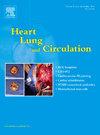The Impact of Cardiovascular-Kidney-Metabolic Syndrome Staging on Depression Risk: A National Study
IF 2.2
4区 医学
Q2 CARDIAC & CARDIOVASCULAR SYSTEMS
引用次数: 0
Abstract
Background
Cardiovascular-kidney-metabolic (CKM) syndrome, recently defined by the American Heart Association, encompasses cardiovascular disease, chronic kidney disease, and metabolic disorders. However, its association with depression across different stages remains unclear.
Method
We analysed 4,097 adults from National Health and Nutrition Examination Survey 2005–2020. Depression was assessed using the Patient Health Questionnaire-9, and CKM stages were classified according to the 2023 American Heart Association guidelines. Survey-weighted multivariable logistic regression was used to examine associations, with subgroup and sensitivity analyses.
Results
The odds of depression increased progressively with CKM severity, with the highest risk observed in Stage 4 (odds ratio [OR] 1.112; 95% confidence interval [CI] 1.039–1.190; p=0.003). Significant associations were also found in Stages 2 and 3. Subgroup analyses revealed stronger associations in females (OR 1.180; 95% CI 1.053–1.322; p=0.005), older adults (OR 1.125; 95% CI 1.081–1.171; p<0.001), Mexican Americans (OR 1.260; 95% CI 1.118–1.419; p<0.001), and individuals with low education (OR 1.463; 95% CI 1.302–1.644; p<0.001).
Conclusions
Advancing CKM stage is significantly associated with increased depression risk, particularly among vulnerable sociodemographic groups. These findings highlight the need for integrated mental health strategies in managing CKM syndrome.
心血管-肾-代谢综合征分期对抑郁症风险的影响:一项全国性研究
背景:心血管肾代谢综合征(CKM),最近由美国心脏协会定义,包括心血管疾病、慢性肾脏疾病和代谢紊乱。然而,它与不同阶段抑郁症的关系尚不清楚。方法:对2005-2020年全国健康与营养调查4097名成年人进行分析。使用患者健康问卷-9对抑郁症进行评估,并根据2023年美国心脏协会指南对CKM分期进行分类。采用调查加权的多变量逻辑回归来检验相关性,并进行亚组分析和敏感性分析。结果:随着CKM严重程度的增加,抑郁的几率逐渐增加,其中第4期的风险最高(优势比[OR] 1.112; 95%可信区间[CI] 1.039-1.190; p=0.003)。在第二和第三阶段也发现了显著的关联。亚组分析显示,女性(OR 1.180; 95% CI 1.053-1.322; p=0.005)和老年人(OR 1.125; 95% CI 1.081-1.171)的相关性更强。结论:CKM分期的进展与抑郁风险的增加显著相关,特别是在弱势社会人口群体中。这些发现强调了在CKM综合征管理中综合心理健康策略的必要性。
本文章由计算机程序翻译,如有差异,请以英文原文为准。
求助全文
约1分钟内获得全文
求助全文
来源期刊

Heart, Lung and Circulation
CARDIAC & CARDIOVASCULAR SYSTEMS-
CiteScore
4.50
自引率
3.80%
发文量
912
审稿时长
11.9 weeks
期刊介绍:
Heart, Lung and Circulation publishes articles integrating clinical and research activities in the fields of basic cardiovascular science, clinical cardiology and cardiac surgery, with a focus on emerging issues in cardiovascular disease. The journal promotes multidisciplinary dialogue between cardiologists, cardiothoracic surgeons, cardio-pulmonary physicians and cardiovascular scientists.
 求助内容:
求助内容: 应助结果提醒方式:
应助结果提醒方式:


